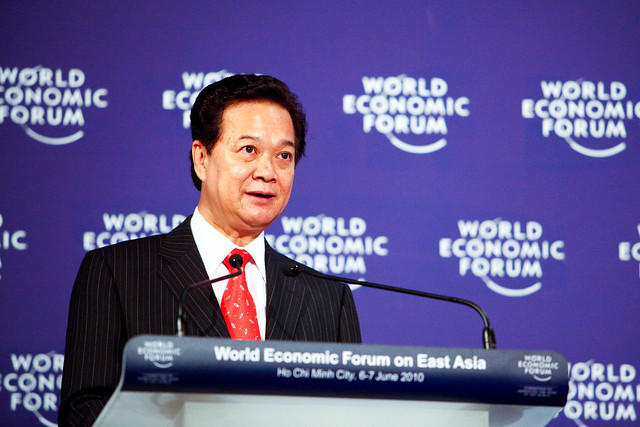By Ernest Bower, Senior Adviser & Director, Southeast Asia Program – CSIS
Prime Minister Nguyen Tan Dung at the World Economic Forum 2010. Photo used under the creative commons license.
Vietnam is Southeast Asia’s third largest country and fastest growing. It does not have a Ministry of Energy. Should it?
A coherent and integrated energy policy is vital to Vietnam’s economic future and features prominently in its national security considerations, particularly those related to development of offshore oil and gas resources and conflicting claims with China in the South China Sea.
In addition, Prime Minister Nguyen Tan Dung is from southern Vietnam and knows from personal experience the real concerns about the impact of hydropower dams upstream on the Mekong River and the devastating impact climate change can have on the sensitive ecology of the delta region.
Vietnam has oil, gas and coal resources and needs policies to address maximizing the benefit of using these locally as opposed to exporting them.
Renewable energy sources are available and of great interest – in fact General Electric manufactures wind turbines in Vietnam – but these green sources of energy are relatively expensive. How should they be integrated into the country’s power generation plans?
When it comes to clean and efficient energy sources, nuclear is an attractive option and Vietnam is in the midst of executing a forward-leaning nuclear energy development plan with help from the United States, Japan, France and Russia. Yet the safety wake up call from Japan has rightly alerted the government and citizens to focus on ensuring that a world-class regulatory system is developed before nuclear plants are built.
PetroVietnam would also benefit from having a ministry that could take up the role of regulator and remove other structural and institutional conflicts, allowing it to accelerate its work to become a world class national oil company.
Finally, Vietnam has done relatively well in terms of attracting new foreign investment, benefiting particularly as companies diversify from Sino-centric Asian manufacturing strategies. However, the mid to long term prospect for power has recently become a concern for investors considering plowing money into the industrious nation.
To encourage needed investment in new power capacity, the government has to examine pricing policies and institutionalize power purchase agreements and sophisticated private public partnerships.
Creating a ministry of energy in Vietnam will focus policy making, send a strong signal to local and foreign investors and modernize Vietnamese governance in a core sector for growth and competitiveness. It will also allow Vietnam to plug into regional (ASEAN Energy Ministers) and global energy forums improving its capacity to adopt international best practices, access technology and integrate technical assistance.
This may be the right time for Prime Minister Dung to create a ministry of energy. The needs are clear. A ministry could coordinate policies within the interagency process in Vietnam, working with the ministries of finance, industry and planning and investment and become a focal point for policy making and implementation.
Vietnam just completed its 11th National Party Congress, and PM Dung was selected to serve another term. He and the other leaders will be approved by the 13th National Assembly in July, at which time he will present his new cabinet line up. As he does so, he may also propose the formation of a ministry of energy.

